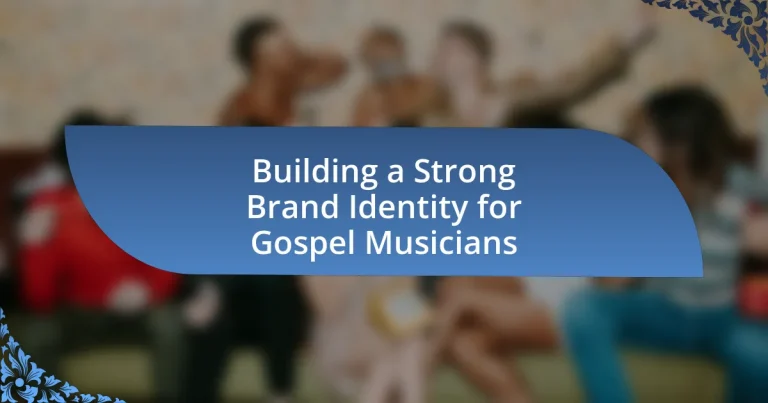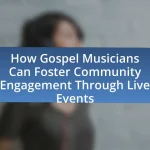Building a strong brand identity for gospel musicians is essential for establishing a unique presence in a competitive music industry. This article outlines the importance of brand identity, highlighting key components such as mission statements, visual elements, and emotional connections with audiences. It discusses strategies for defining and maintaining a brand identity, including the use of social media, networking, and consistent messaging. Additionally, the article addresses challenges gospel musicians face in brand building and offers practical tips for enhancing their brand presence and measuring effectiveness through audience engagement metrics.
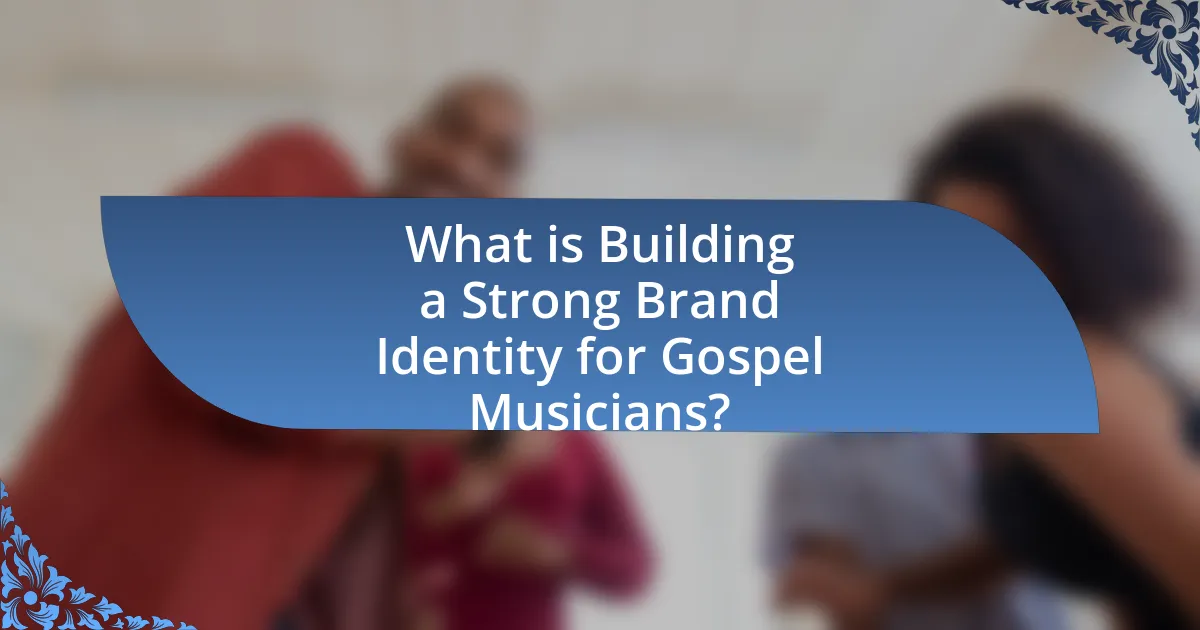
What is Building a Strong Brand Identity for Gospel Musicians?
Building a strong brand identity for gospel musicians involves creating a unique and recognizable image that resonates with their audience and reflects their values and message. This process includes defining a clear mission, developing a consistent visual style, and engaging authentically with fans through various platforms. Research indicates that musicians with a well-defined brand identity can increase their fan engagement and loyalty, as evidenced by studies showing that 64% of consumers cite shared values as the primary reason for a brand relationship.
Why is brand identity important for gospel musicians?
Brand identity is crucial for gospel musicians because it establishes their unique presence in a competitive music industry. A strong brand identity helps gospel musicians differentiate themselves, communicate their values, and connect emotionally with their audience. For instance, artists like Kirk Franklin and Tasha Cobbs Leonard have successfully built recognizable brand identities that resonate with their fans, leading to increased loyalty and engagement. This connection can translate into higher album sales, concert attendance, and social media following, ultimately enhancing their career longevity and impact within the gospel music community.
What elements contribute to a strong brand identity?
A strong brand identity is built on several key elements: a clear mission statement, consistent visual elements, a unique voice, and emotional connection with the audience. The mission statement defines the brand’s purpose and values, guiding all branding efforts. Consistent visual elements, such as logos, color schemes, and typography, create recognition and differentiation in the market. A unique voice ensures that the brand communicates in a way that resonates with its target audience, fostering relatability. Finally, establishing an emotional connection through storytelling and shared values enhances loyalty and engagement. These elements collectively contribute to a cohesive and memorable brand identity, essential for gospel musicians aiming to connect with their audience effectively.
How does brand identity influence audience perception?
Brand identity significantly influences audience perception by shaping how individuals recognize and relate to a brand. A well-defined brand identity, which includes elements such as logo, color scheme, messaging, and overall aesthetic, creates a consistent image that resonates with the target audience. For instance, research indicates that 73% of consumers love a brand because of its personality, which is a direct result of its identity. This connection fosters trust and loyalty, leading to a positive perception of the brand. Furthermore, a strong brand identity differentiates a brand from competitors, making it more memorable and appealing to the audience.
What are the key components of a brand identity?
The key components of a brand identity include the brand name, logo, color palette, typography, imagery, and messaging. These elements work together to create a cohesive representation of the brand’s values and personality. For instance, the brand name serves as the primary identifier, while the logo visually encapsulates the brand’s essence. The color palette influences emotional responses, and typography contributes to the brand’s voice. Imagery and messaging further reinforce the brand’s narrative and connect with the target audience. Collectively, these components establish recognition and differentiation in the market.
How do logos and visuals play a role in brand identity?
Logos and visuals are essential components of brand identity as they create immediate recognition and convey the brand’s values and personality. A well-designed logo serves as a visual anchor, making it easier for audiences to identify and remember the brand. For example, research indicates that consistent use of visual elements can increase brand recognition by up to 80%. Additionally, visuals such as color schemes and typography evoke emotional responses, influencing consumer perceptions and loyalty. This connection between visuals and brand identity is crucial for gospel musicians, as it helps them communicate their message and resonate with their audience effectively.
What messaging strategies enhance brand identity?
Messaging strategies that enhance brand identity include consistent storytelling, audience engagement, and emotional connection. Consistent storytelling allows gospel musicians to convey their unique narratives and values, reinforcing their brand identity across various platforms. Audience engagement through social media and live performances fosters a community around the brand, making it more relatable and memorable. Emotional connection is achieved by sharing personal experiences and testimonies, which resonate with audiences and strengthen brand loyalty. Research indicates that brands with strong emotional connections can achieve a 23% increase in customer loyalty, highlighting the effectiveness of these strategies in building a robust brand identity.
How can gospel musicians define their unique brand identity?
Gospel musicians can define their unique brand identity by identifying their core message, musical style, and target audience. By articulating a clear mission statement that reflects their beliefs and values, musicians can differentiate themselves in a crowded market. For instance, artists like Kirk Franklin and Tasha Cobbs Leonard have successfully established distinct identities by blending traditional gospel with contemporary sounds, appealing to diverse demographics. This strategic alignment of message and style not only enhances recognition but also fosters a loyal fan base, as evidenced by their chart-topping albums and sold-out concerts.
What personal values should gospel musicians communicate?
Gospel musicians should communicate values such as faith, integrity, compassion, and authenticity. These values resonate deeply with their audience, reinforcing the spiritual messages conveyed through their music. Faith is central, as it reflects the core belief system that drives their artistry. Integrity ensures that their actions align with their messages, fostering trust among listeners. Compassion allows them to connect emotionally with their audience, addressing shared struggles and uplifting spirits. Authenticity is crucial, as it encourages genuine expression and relatability, making their music more impactful. Together, these values help establish a strong brand identity that resonates with the gospel music community and beyond.
How can musicians differentiate themselves in a crowded market?
Musicians can differentiate themselves in a crowded market by developing a unique brand identity that reflects their personal values and artistic vision. This involves creating a distinct sound, visual style, and narrative that resonates with their target audience. For example, gospel musicians can incorporate personal testimonies and cultural elements into their music and performances, which can foster a deeper connection with listeners. Research indicates that artists who maintain authenticity and engage with their audience through storytelling are more likely to build a loyal fan base, as seen in the success of artists like Kirk Franklin and Tasha Cobbs Leonard, who effectively blend personal experiences with their musical offerings.
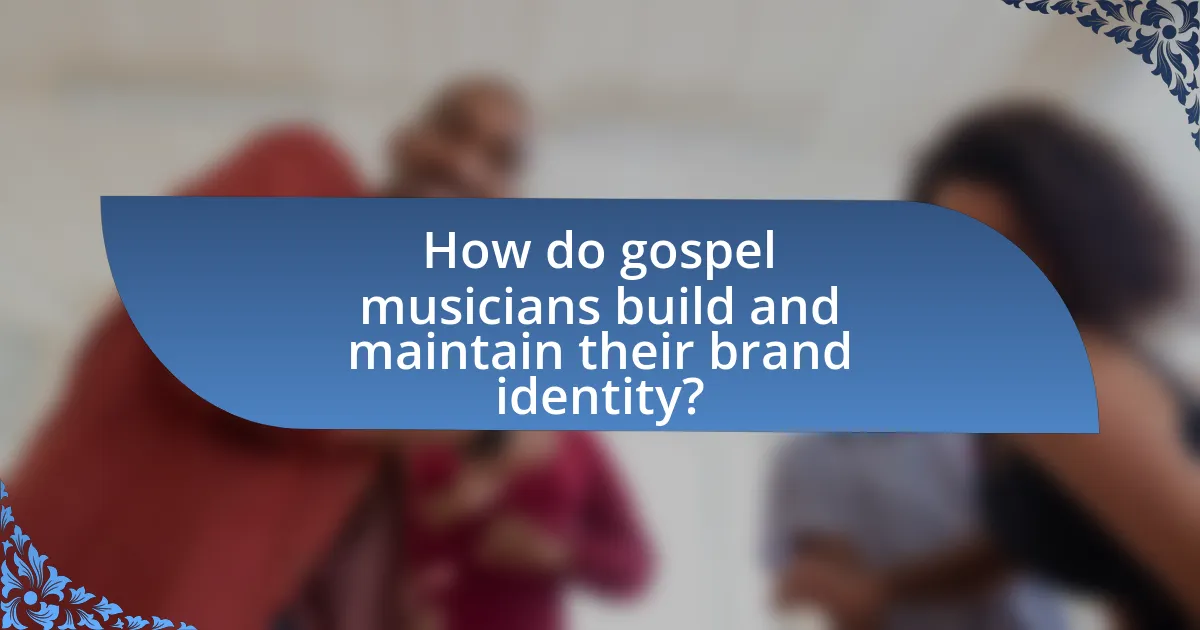
How do gospel musicians build and maintain their brand identity?
Gospel musicians build and maintain their brand identity through consistent messaging, authentic storytelling, and engagement with their audience. By defining a clear mission and vision that resonates with their faith-based values, these artists create a recognizable image that aligns with their music and message. For instance, many successful gospel musicians utilize social media platforms to share personal testimonies and behind-the-scenes content, fostering a deeper connection with fans. Additionally, collaborations with other artists and participation in community events help reinforce their brand identity within the gospel music genre. This approach not only enhances visibility but also cultivates a loyal fan base that identifies with their artistic and spiritual journey.
What strategies can be employed to establish a brand identity?
To establish a brand identity, gospel musicians can employ strategies such as defining their unique value proposition, creating a consistent visual identity, and engaging with their audience through storytelling. Defining a unique value proposition helps musicians articulate what sets them apart in the gospel music genre, which is essential for attracting and retaining listeners. A consistent visual identity, including logos, color schemes, and typography, reinforces brand recognition and creates a cohesive image across all platforms. Engaging with the audience through storytelling allows musicians to connect on a personal level, fostering loyalty and community. These strategies are supported by research indicating that brands with a clear identity and strong audience engagement achieve higher recognition and loyalty, as seen in studies by the American Marketing Association.
How can social media be leveraged for brand building?
Social media can be leveraged for brand building by creating engaging content that resonates with the target audience. Gospel musicians can utilize platforms like Instagram, Facebook, and TikTok to share their music, behind-the-scenes moments, and personal stories, fostering a deeper connection with fans. According to a 2021 survey by Hootsuite, 54% of social media users use these platforms to research products, indicating that consistent and authentic engagement can enhance brand visibility and credibility. By actively interacting with followers through comments, live sessions, and user-generated content, gospel musicians can cultivate a loyal community, ultimately strengthening their brand identity.
What role does networking play in brand identity development?
Networking plays a crucial role in brand identity development by facilitating connections that enhance visibility and credibility. Through networking, gospel musicians can engage with industry professionals, influencers, and audiences, which helps to establish their unique brand presence. For instance, collaborations with other artists or participation in events can lead to increased exposure and recognition, reinforcing their brand identity. Research indicates that 85% of jobs are filled through networking, highlighting its importance in building professional relationships that can elevate a musician’s brand.
How can gospel musicians ensure consistency in their brand identity?
Gospel musicians can ensure consistency in their brand identity by developing a clear and cohesive message that reflects their values and mission. This involves creating a recognizable visual style, including logos and color schemes, that aligns with their musical themes and audience expectations. Additionally, maintaining a consistent tone in their communication across social media, marketing materials, and performances reinforces their brand identity. Research indicates that brands with consistent messaging can achieve up to 23% more revenue than those without, highlighting the importance of uniformity in brand presentation.
What practices help maintain a cohesive brand message?
Consistent messaging across all platforms helps maintain a cohesive brand message. This includes using the same tone, visual elements, and key messages in social media, websites, and promotional materials. Research indicates that brands with consistent messaging can see a revenue increase of up to 23% (Lucidpress, 2019). Additionally, regular training for team members on brand guidelines ensures everyone communicates the brand’s values uniformly, reinforcing the brand identity effectively.
How can musicians adapt their brand identity over time?
Musicians can adapt their brand identity over time by continuously evolving their image, sound, and messaging to reflect personal growth and changing audience preferences. This evolution can involve experimenting with new musical styles, collaborating with diverse artists, and engaging with fans through social media to gather feedback. For instance, artists like Taylor Swift have successfully transitioned from country to pop, showcasing adaptability in their brand identity while maintaining a loyal fan base. Additionally, musicians can analyze market trends and audience demographics to ensure their branding resonates with current listeners, as seen in the rise of genre-blending artists who attract wider audiences.
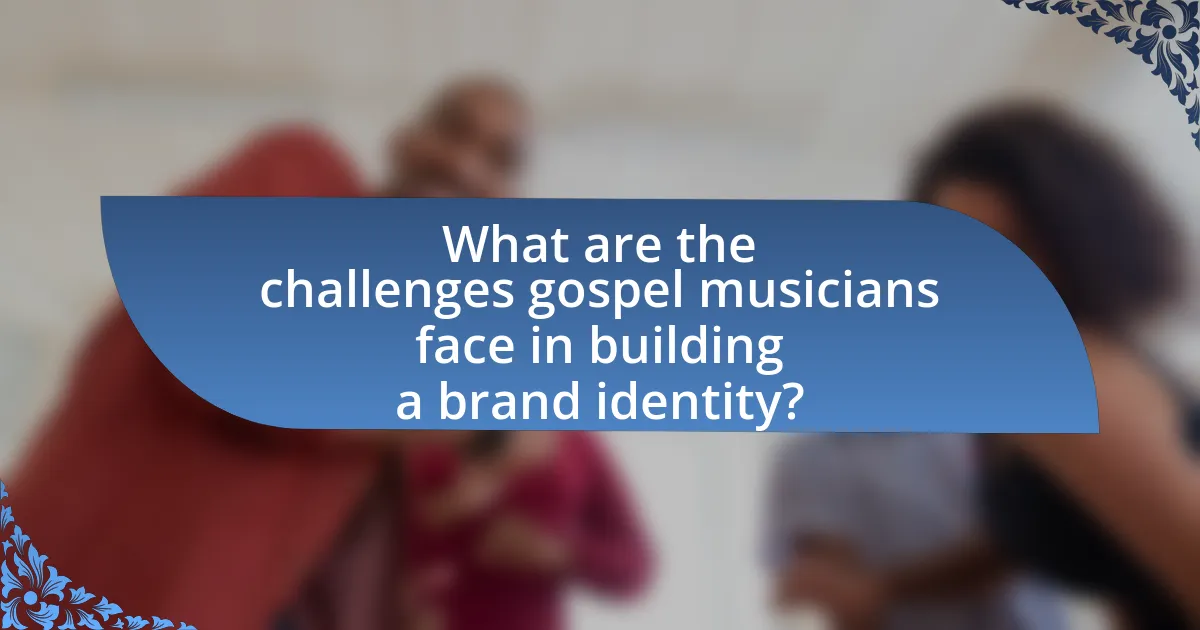
What are the challenges gospel musicians face in building a brand identity?
Gospel musicians face several challenges in building a brand identity, including market saturation, limited resources, and the need for authenticity. The gospel music industry is highly competitive, with numerous artists vying for attention, making it difficult for individual musicians to stand out. Additionally, many gospel musicians operate with limited financial and promotional resources, which can hinder their ability to effectively market themselves and reach wider audiences. Furthermore, maintaining authenticity while appealing to diverse audiences poses a challenge, as artists must balance their personal beliefs with commercial viability. These factors collectively complicate the process of establishing a distinct and recognizable brand identity in the gospel music landscape.
What common pitfalls should gospel musicians avoid?
Gospel musicians should avoid the pitfall of compromising their message for commercial success. This often leads to a disconnect with their audience, as authenticity is crucial in gospel music. Research indicates that artists who maintain their core values and message tend to build stronger, more loyal fan bases. For instance, a study by the Pew Research Center highlights that audiences are more likely to support artists who resonate with their beliefs and values, emphasizing the importance of staying true to one’s musical and spiritual identity.
How can musicians overcome negative perceptions?
Musicians can overcome negative perceptions by actively engaging with their audience and showcasing authenticity in their work. This involves transparent communication through social media, where artists can share personal stories and experiences that resonate with fans, thereby humanizing their image. Research indicates that artists who maintain a consistent and genuine online presence are perceived more positively; for instance, a study by the University of Southern California found that authenticity in branding significantly enhances audience trust and loyalty. By addressing misconceptions directly and demonstrating their commitment to their craft and community, musicians can reshape public opinion and foster a more favorable image.
What strategies can help in dealing with competition?
To effectively deal with competition, gospel musicians can adopt strategies such as differentiating their brand through unique musical styles, engaging storytelling, and authentic messaging. By creating a distinctive sound or theme that resonates with their audience, musicians can stand out in a crowded market. For instance, artists like Kirk Franklin have successfully blended traditional gospel with contemporary genres, attracting a diverse fan base. Additionally, leveraging social media platforms for direct engagement with fans can enhance visibility and loyalty, as seen with artists who regularly share personal stories and behind-the-scenes content. These strategies not only build a strong brand identity but also foster a deeper connection with the audience, making it harder for competitors to replicate.
How can gospel musicians measure the effectiveness of their brand identity?
Gospel musicians can measure the effectiveness of their brand identity through audience engagement metrics, social media analytics, and feedback from live performances. Audience engagement metrics, such as the number of streams, downloads, and shares of their music, provide quantitative data on how well their brand resonates with listeners. Social media analytics, including follower growth, interaction rates, and sentiment analysis, reveal how effectively their messaging and image connect with their target audience. Additionally, feedback from live performances, such as audience reactions and merchandise sales, offers qualitative insights into the brand’s impact. These methods collectively provide a comprehensive view of brand effectiveness, supported by data that reflects audience behavior and preferences.
What metrics indicate a strong brand presence?
Metrics that indicate a strong brand presence include brand awareness, engagement rates, social media following, and customer loyalty. Brand awareness measures how well consumers recognize and recall a brand, often assessed through surveys or market research; for instance, a study by Nielsen found that 59% of consumers prefer to buy new products from brands familiar to them. Engagement rates, which reflect interactions such as likes, shares, and comments on social media, indicate how effectively a brand connects with its audience; higher engagement often correlates with a stronger brand presence. Social media following quantifies the number of followers across platforms, serving as a direct indicator of a brand’s reach and popularity. Lastly, customer loyalty, measured through repeat purchases and brand advocacy, demonstrates the strength of a brand’s relationship with its consumers; according to a report by Bain & Company, increasing customer retention rates by just 5% can increase profits by 25% to 95%.
How can feedback be utilized to improve brand identity?
Feedback can be utilized to improve brand identity by systematically gathering insights from audiences and stakeholders to refine messaging and visual elements. For instance, gospel musicians can conduct surveys or focus groups to understand how their music and image resonate with fans, allowing them to adjust their branding strategies accordingly. Research indicates that brands that actively seek and implement feedback can enhance customer loyalty by up to 30%, demonstrating the effectiveness of this approach in creating a more relatable and authentic brand identity.
What practical tips can gospel musicians follow to strengthen their brand identity?
Gospel musicians can strengthen their brand identity by consistently defining their unique message and style. Establishing a clear mission statement that reflects their values and beliefs helps differentiate them in a crowded market. Additionally, engaging with their audience through social media platforms fosters a sense of community and loyalty. Regularly releasing high-quality music and visuals that align with their brand further reinforces their identity. Collaborating with other artists and participating in community events can also enhance visibility and credibility. According to a study by the Berklee College of Music, artists who actively engage with their audience see a 30% increase in fan retention, demonstrating the effectiveness of these strategies.
